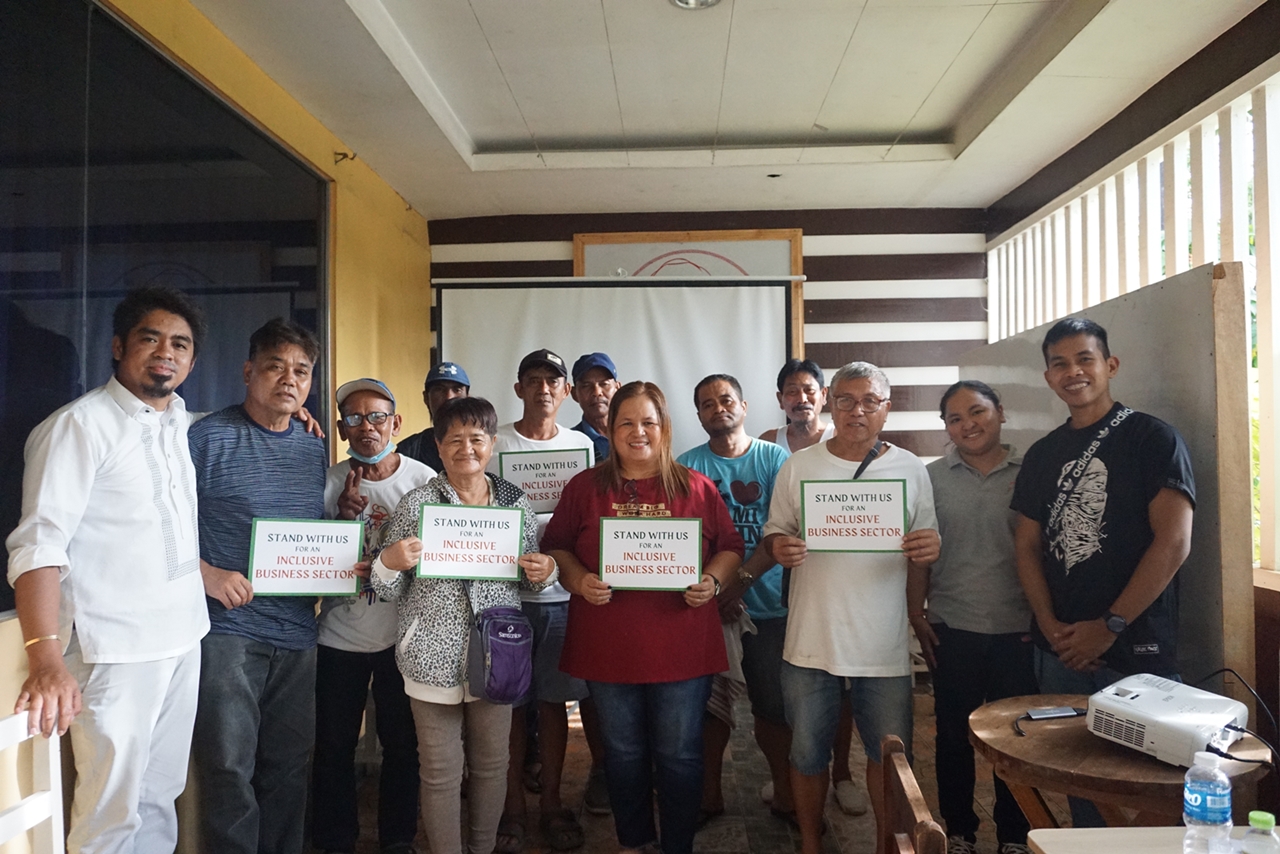ECONOMIC RIGHTS
Farmers feed the country – it’s about time we listen to them

By Elijah Macaspac
The Philippines is one of the top exporters of bananas in the world, but still, most banana growers belong to the poorest and most disadvantaged groups of our society. Through inclusive collaborations among stakeholders, policies and interventions can look into farmers’ conditions to actually address their needs.
Last March 28, the Initiatives for Dialogue and Empowerment (IDEALS) facilitated a workshop on government agricultural interventions and policy developments to understand its impact on the current situation of agrarian reform beneficiaries (ARBs) in Compostela, Davao de Oro.
This activity is under the Gender Transformative and Responsible Agribusiness Investments in Southeast Asia (GRAISEA). GRAISEA is a Southeast Asia-wide project funded by Oxfam that aims to enhance the economic empowerment of marginalized communities in the agriculture sector through responsible business practices and inclusive value chains. In the Philippines, it is implemented by Oxfam Pilipinas, in partnership with IDEALS and Institute for Social Entrepreneurship in Asia (ISEA).
Sustaining Efforts for the Farmers
Majority of the participants are Comprehensive Agrarian Reform Program (CARP) beneficiaries from cooperatives like the Selecta Farm Multipurpose Cooperative (SELECTA), Davao Fruits Banana Growers Agrarian Reform Cooperative (DFBGARC), DFC PAWARB Multipurpose Cooperative (PAWARBCO) and Survivor Farm.
During the activity, they learned about the programs and services of the Agricultural Training Institute (ATI) in Davao Region (Region XI) from Lucille Camarines, officer-in-charge of the Information Services Section.
ATI is an agency of the Philippine government under the Department of Agriculture (DA) responsible for conducting and ensuring that all training programs are tailored to the actual demands of Philippine farmers. It also provides support so that relevant research and innovations are relayed to farmers through the appropriate training and extension activities.
Camarines talked about the services they offer to farmers in Region XI. They offer various types of advisory services for both farmers and fisher communities, especially at vulnerable areas with high dependency on sustainable agriculture practices for food security, income generation, poverty and alleviation. These services include: (i) training on good agricultural practices for competency and competitiveness; (ii) demonstration of agriculture technologies and innovations; (iii) advisory services; (iv) information services that enhance agriculture extension knowledge products and services; (v) governance to provide an enabling environment for agriculture and fisheries.
However, while these programs are helpful, farmers expressed some concerns on its suitability for them. The farmers spoke about the difficulties they encountered in trying to access these services. They pointed out the lack of programs offered particularly to growers of cavendish bananas like them. They also related that the difficulty of obtaining a loan was a common problem for all. Some of the farmers actually failed to get loans as they did not have all the documents that banks require.
Similarly, farmers also consulted these issues with IDEALS Consultant, Atty. Irvin Sagarino, during the activity. According to them, one of their biggest challenges is breaking free from their unjust and unfair contracts with a multinational agricultural company that exports crops from Mindanao.
Previously, farmers successfully negotiated some amendments to the contract with the help of the local government of Compostela, Compostela Valley. Unfortunately, only around 16% of the farmers are part of cooperatives. They continue to work together to have leverage in negotiating with the company.
According to Atty. Sagarino, a possible way to access financing is for farmers to have individual contracts with the company to pursue collateralized loans on their own. Further, another crucial way to gain more access to financing is the issuance of individual titles from the Department of Agrarian Reforms (DAR). This process might take a while since the farmers need to fulfill necessary documents which might be difficult for them.
Moreover, the Agrarian Production Credit Program (APCP) is one of the financing programs farmers can avail at an affordable cost. It is implemented jointly by the Department of Agriculture (DA) and the Land Bank of the Philippines (LBP). However, some of the farmers disclosed that they were unable to apply for an APCP loan because the banks required an identification number that the company failed to provide.
Government policies and interventions play a major role in shaping food and agriculture. However, there is a pressing need to focus more on policies that expressly capacitate banana farmers.
Private sector stakeholders such as companies and banks can encourage much-needed investment in agriculture and assure ethical supply chains that benefit small-scale producers, workers, and customers. The private sector needs to cooperate more to make the loan processes for farmers easier and as urgently as they need it.
Letting the Community Lead
Atty. Irene Pua, legal officer from IDEALS, also discussed the statuses of the Inclusive Business (IB) Bill, the Poverty Reduction through Social Entrepreneurship (PRESENT) Bill and how these are key in serving their needs.
The Inclusive Business Bill acknowledges the crucial function of the private sector in fostering inclusive development at the local and national levels. One of its primary objectives is to support small producers increase their productivity and capacity to actively engage in inclusive businesses.
IB models give underprivileged communities chances to improve their standard of living by being incorporated into the value chains of corporations, allowing them to grow through a scalable and sustainable approach. Moreover, IB models that help close access gaps for farmers secure their economic empowerment.
In addition, the PRESENT Bill also encourages social enterprises (SE), which are “social mission driven organizations in pursuit of partnerships with the poor to improve or transform their lives.”
Participants said that although they were unfamiliar with these measures, they seemed promising. According to them, their farms and plantations cannot develop into sustainable workplaces if their poor employment and living conditions remain the same. The bills can provide opportunities to participate in decisions that affect their lives and workplaces.
Currently, these bills are pending in both houses of Congress. Once the bills pass, farmers will receive the respect and resources essential to strengthen their participation in sustainable agriculture.
Filipino farmers hope to put an end to their exploitation. The agricultural sector will have a better chance withstanding adversity if everyone is given the support and opportunity to rise above their circumstances. They need partners that truly stand with them.
Institute for Social Entrepreneurship in Asia (ISEA). (2020, December). Social Enterprise Action Research Report. Retrieved March 15, 2023, from https://www.isea-group.net/resources/publications/social-enterprise-action-research-inclusive-and-innovative-pathways-to-covid19-recovery-social-entrepreneurship-as-strategy-in-leaving-no-one-behind-and-building-back-better-in-the-philippines/.
